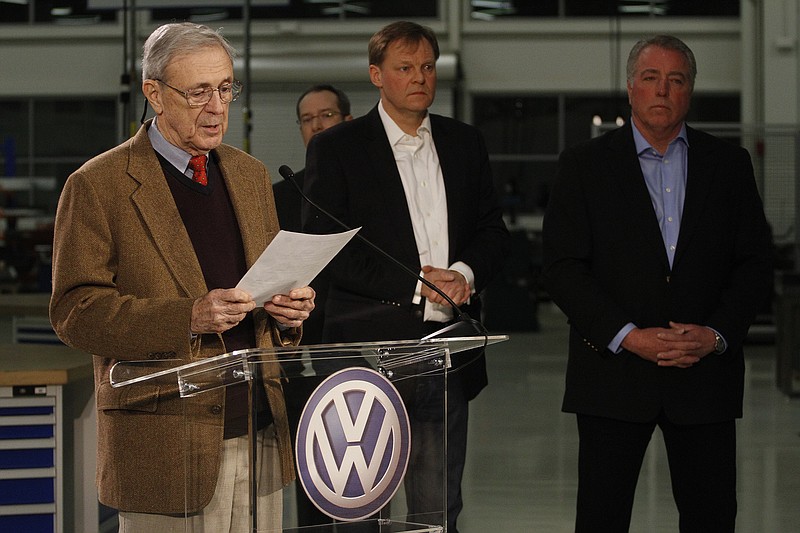After signing up what it says is a majority of hourly production workers at the Chattanooga Volkswagen plant, the United Auto Workers wants to join with VW to form America's first German-style works council in Chattanooga.
UAW's No. 2 leader, Secretary-Treasurer Gary Casteel, said Thursday the union has given VW a "vision statement" and outline of how the German automaker might join with the UAW in a works council involving both blue- and white-collar workers.
"We think it's an appropriate time to put this model forward and give VW the time to look and study this fully fleshed out model and move toward what we've all been looking forward to for a long time and that is to have a represented facility and the first U.S. fully functioning works council," Casteel said.
Volkswagen has works councils in which workers and managers discuss and negotiate work rules and processes at all of its major production plants other than the U.S. assembly plant in Chattanooga. The Chattanooga plant also is the only VW production plant where workers are not represented by a union.
Casteel said he believes the UAW is supported by a majority of the hourly production employees at the VW plant, even though a rival labor group, the American Council of Employees (ACE), has also gotten signatures from more than 15 percent of the workers for ACE to meet with VW managers under the company's Community Organization Engagement policy.
Casteel said he wants the UAW to be recognized without another union certification election, similar to one the union narrowly lost a year ago.
"We're not looking for another election, but we do want to be the exclusive bargaining agent at some point," he said.
But VW said Thursday it will keep talking with representatives from both UAW and ACE. VW spokesman Scott Wilson said Volkwagen's Chattanooga management has been meeting with both UAW Local 42 and the American Council of Employees over the past six months.
"This policy has been a very effective way to start a dialog with each of the groups and we intend to continue with the COE policy," Wilson said.
UAW presented signatures from more than 45 percent of the workers and ACE gave VW signatures from more than 15 percent of the plant employees.
ACE president Sean Moss described the UAW's proposed works council model as a "Trojan horse," to gain UAW representation without an election.
"This proposal outlines the UAW's plan to gain exclusive representation, and then merely segregate and rename certain functions carried out by its Local, so that a 'works council' would exist in name only and all power would remain with the UAW bosses in Detroit," Moss said. "This proposal is an obvious attempt to distract employees' from the very real progress being made by ACE to implement the works council model we proposed last month, which would provide real co-determination and guarantee access to hourly and salaried employees alike."
With 816 VW employees now belonging to UAW Local 42, the union has "a clear majority of the blue-collar workforce in the Chattanooga plant" and UAW should be recognized by VW without another certification election, Casteel said.
But in February 2014, the UAW lost a unionization bid at the Volkswagen plant in Chattanooga when hourly workers voted 712 to 626 against the union in an NLRB-supervised election.
Since the UAW started Local 42 in Chattanooga following that election defeat, however, the union has signed up what it says are 55 percent of the total blue collar workforce, according to union filings with the U.S. Department of Labor. Until the workers have a union contract, however, they do not pay UAW dues.
"We believe the time has come to resume the works council talks that we began with management more than a year ago," Casteel said.
The original works council concept, agreed to by UAW and Volkswagen officials as part of a larger election agreement in January 2014, outlined a framework through which the union and the company could together establish a path for management and employees to cooperate on matters inside the plant, Casteel said.
In its 24-page "Vision Statement" for a collectively bargained Works Council, the union "delegates to the works council powers that are normally associated with union activity," Casteel said. The council would involve both hourly and management employees.
The union bid for recognition at VW could be aided by the new interim chairman of Volkswagen, former IG Metall president Berthold Huber, who has backed the UAW and urged Chattanooga VW workers last year to support the union. Huber wrote to Chattanooga VW workers last year urging them to vote for the UAW because "union representation is a necessary precondition for the election of a works council according to U.S. labor law."
Casteel said Huber "is a good friend of the UAW no doubt, but he also has a fiduciary responsibility to the VW board.
Casteel suggested the union is not in a hurry to gain recognition and a contract for VW workers.
"We've been very respectful of VW's position on these issues," he said. "There's been a lot of bumps in the road, but it's getting to the point of moving to the next level."
Contact Dave Flessner at dflessner@timesfreepress.com or 757-6340.
